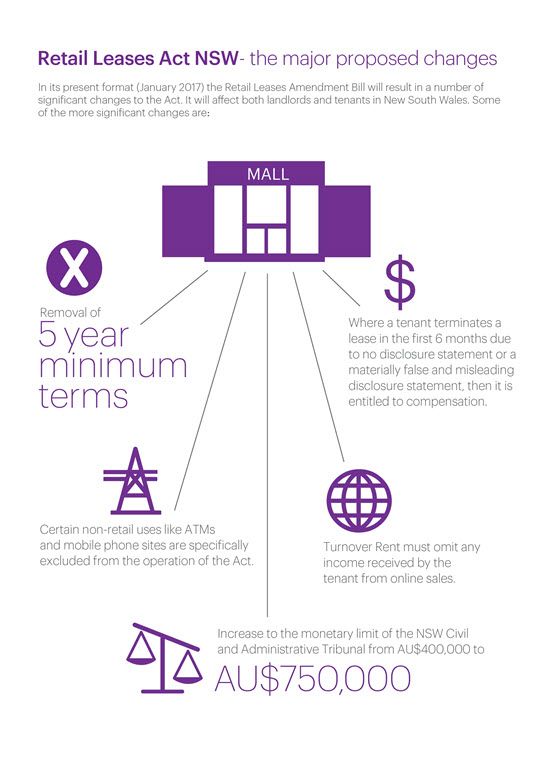If passed by the Parliament in its current form, the Retail Leases Amendment (Review) Bill 2016 will represent a significant update to the Retail Leases Act 1994 (Act).
Following considerable industry consultation, draft legislation has been recommended to the New South Wales Legislative Assembly by the Minister for Small Business, John Barilaro. The amending legislation is the result of almost two years of discussion and consultation between the Government and industry following the release of a discussion paper in late 2013 which identified a number of challenges and problems with the current retail leasing regime in New South Wales.
Few in the industry would argue that the Act was not in need of a significant update to reflect the modern bricks and mortar retail environment and to resolve a number of reasonably significant ambiguities that exist in the current legislation.
The major changes
The amending legislation will result in a number of significant changes to the Act. It will affect both landlords and tenants in New South Wales and will likely influence the evolution of retail lease legislation in other jurisdictions. Some of the more significant changes are:
- the removal of minimum five year terms for retail shop leases;
- a requirement for more detailed disclosure by a landlord in its disclosure statement of any obligation on a tenant to contribute to outgoings—recovery of outgoings that are not disclosed is prevented;
- if a tenant exercises its right to terminate a retail shop lease in the first six months, because it was not provided with a disclosure statement or the disclosure statement was materially false or misleading, then it is entitled to compensation for the costs incurred by the tenant in entering into the lease—including fitout costs;
- the exclusion of non-retail uses from the operation of the Act including ATMs, certain storage areas, vending machines, communications towers, signage displays, public telephones and children's rides;
- turnover rent payable by a tenant must omit any income received from online transactions—except where it is a 'click and collect' styled transaction or the transaction occurs while the customer is at the shop. Further, the landlord cannot require disclosure of any income generated from online sales except in those circumstances;
- retail leases of more than three years must be registered and a landlord must lodge the lease for registration within three months after the signed lease has been provided to the landlord;
- an increase in the monetary limit on the jurisdiction of the Civil and Administrative Tribunal from AU$400,000 to AU$750,000 for claims made under the Act;
- confirmation that a landlord is not required to demolish the whole of a retail shopping centre or building of which a shop forms part where it is relying on a demolition clause in a lease; and
- clarification that market stalls in a temporary market are not subject to the provisions of the Act and the removal of an unnecessary and confusing exception in the Act that specifies that premises in an office tower above a retail shopping centre are not subject to the Act.
Anyone that is familiar with retail leasing will recognise that many of the items summarised above come up regularly during negotiations or centre redevelopment. The changes would largely appear to be sensible to those familiar with the industry.
No more five year terms
Clearly the removal of minimum five year terms for retail shop leases in New South Wales will be a significant development and may have a major impact—particularly on smaller retailers.
While minimum five year terms are commonly 'contracted out of' under the current Retail Leases Act by a certificate issued by the tenant's solicitor or conveyancer, five year terms have, to some extent, become standard in the industry. Minimum five year terms were originally introduced to allow a retailer a greater opportunity to develop goodwill in their business.
However, other than for established retailers, large shopping centre owners are increasingly interested in short term opportunities to see what works in a given space and what is successful in their tenancy mix. The proliferation of pop-up retail in recent years is evidence of this and the variety it offers has been gladly received by the shopping public.
Where to now?
The amending legislation is still before the Parliament. If passed in its current form, it will commence on a date yet to be determined. This may be in the next few months but there could be changes to the Bill before that time.
We will provide a further update once the legislation has passed the Parliament and expect other jurisdictions may follow the lead of New South Wales in this space.

Dentons is the world's first polycentric global law firm. A top 20 firm on the Acritas 2015 Global Elite Brand Index, the Firm is committed to challenging the status quo in delivering consistent and uncompromising quality and value in new and inventive ways. Driven to provide clients a competitive edge, and connected to the communities where its clients want to do business, Dentons knows that understanding local cultures is crucial to successfully completing a deal, resolving a dispute or solving a business challenge. Now the world's largest law firm, Dentons' global team builds agile, tailored solutions to meet the local, national and global needs of private and public clients of any size in more than 125 locations serving 50-plus countries. www.dentons.com.
The content of this article is intended to provide a general guide to the subject matter. Specialist advice should be sought about your specific circumstances.


